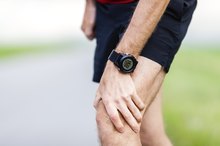My Ears Hurt When Eating
Ear pain can come from a long list of conditions, but if your ears only hurt when you eat, the list of causes narrows considerably. If you go about your day or sleep at night without feeling pain in your ears, two scenarios are likely to be the cause. Both involve the mechanical movement of eating and neither has to do with your ears.
If you are experiencing serious medical symptoms, seek emergency treatment immediately.
TMJ Disorders
The temporomandibular joint acts as a hinge where the upper and lower jaw meet at the temporal bone. It controls the biting motion. The TMJ also enables you to make a lateral movement for crushing your food. Both mechanics become necessary for you to chew. Disorders of the TMJ can stem from bruxism -- teeth grinding, usually while you sleep 23. Another cause of TMJ results from the dislocation of the joint. If you have arthritis in the joint, the bones may fuse together, making it difficult and painful for you to chew. If the fusion becomes total, you would lose mobility of the jaw.
- The temporomandibular joint acts as a hinge where the upper and lower jaw meet at the temporal bone.
- Disorders of the TMJ can stem from bruxism -- teeth grinding, usually while you sleep 2.
TMJ Diagnosis and Treatment
How to Relieve a Toothache with Pressure Points
Learn More
A common symptom of TMJ disorder is ear pain. You sense the pain in the ear because of its proximity to the TMJ. The actual pain emanates from your TMJ, but it radiates to your ears. You may experience a clicking of the TMJ with up-and-down or side-to-side movement. Your jaw may ache or give you shooting pains with movements apart from chewing, such as talking or yawning. Treatment ranges from conservative use of anti-inflammatories to surgery. See your dentist to rule out dental decay and gum disease before treating a TMJ disorder.
- A common symptom of TMJ disorder is ear pain.
- You may experience a clicking of the TMJ with up-and-down or side-to-side movement.
Bruxism
Many people do it and don’t even know it. Bruxism stems from the day’s stressors. Often, a dentist will point it out to you when examining your teeth. Your teeth have wear and tear that presents as smooth-surfaced molars and blunted incisors. Like stretching, the act of bruxism brings a sense of relaxation. For some people, this becomes a way of making the transition from a stressful day to restorative sleep.
- Many people do it and don’t even know it.
- Often, a dentist will point it out to you when examining your teeth.
Bruxism Diagnosis and Treatment
Pain Above the Knee Cap With Running
Learn More
If you experience anxiety, stress or depression on a daily basis, become aware of other symptoms of bruxism. These include:
- a sore jaw
- ear pain
- headaches
- insomnia
- sensitivity to hot
- cold or sugar in your teeth,
- anorexia
Your dentist may supply you with a mouth guard that prevents your teeth from making contact while you sleep. There are also a variety of splints that keep your upper and lower teeth apart.
Related Articles
References
- Medline Plus: Bruxism
- Medline Plus: TMJ Disorders
- MayoClinic.com: TMJ Disorders
- Ella B, Ghorayeb I, Burbaud P, Guehl D. Bruxism in movement disorders: A comprehensive review. J Prosthodont. 2017;26(7):599-605. doi:10.1111/jopr.12479
- Falisi G, Rastelli C, Panti F, Maglione H, Quezada Arcega R. Psychotropic drugs and bruxism. Expert Opin Drug Saf. 2014;13(10):1319-26. doi:10.1517/14740338.2014.947262
- Shetty S, Pitti V, Satish Babu CL, Surendra Kumar GP, Deepthi BC. Bruxism: A literature review. J Indian Prosthodont Soc. 2010;10(3):141-8. doi:10.1007/s13191-011-0041-5
- UptoDate. Sleep-related bruxism (tooth grinding). Updated September 4, 2019.
- Lobbezoo F, Visscher CM, Ahlberg J, Manfredini D. Bruxism and genetics: A review of the literature. J Oral Rehabil. 2014;41(9):709-14. doi:10.1111/joor.12177
- Guaita M, Högl B. Current treatments of bruxism. Curr Treat Options Neurol. 2016;18(2):10. doi:10.1007/s11940-016-0396-3
- Asutay F, Atalay Y, Asutay H, Acar AH. The evaluation of the clinical effects of botulinum toxin on nocturnal bruxism. Pain Res Manag. 2017;2017:6264146. doi:10.1155/2017/6264146
- Bertazzo-Silveira E, Kruger CM, Porto de toledo I, et al. Association between sleep bruxism and alcohol, caffeine, tobacco, and drug abuse: A systematic review. J Am Dent Assoc. 2016;147(11):859-866.e4. doi:10.1016/j.adaj.2016.06.014
Writer Bio
Vita Ruvolo-Wilkes was first published in 1977. She worked as a certified aerobics and exercise instructor. Upon graduating from the Wake Forest University School of Medicine, she worked for the VA Medical Center. As a physician assistant, Ruvolo-Wilkes designed specialized diets for her patients' conditions and has written a monthly health column in the "Montford Newsletter."









